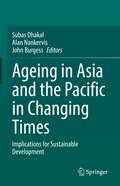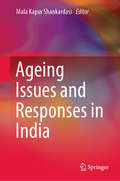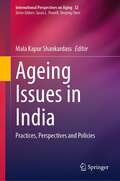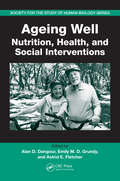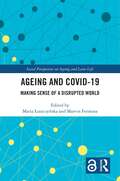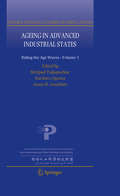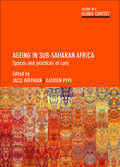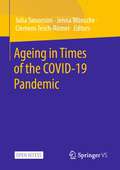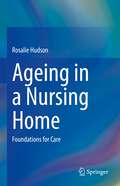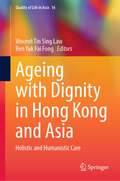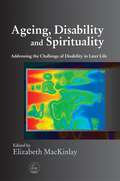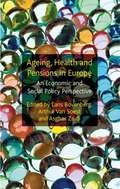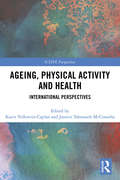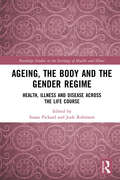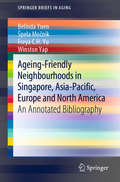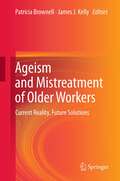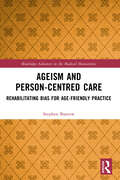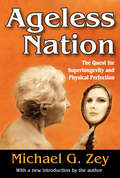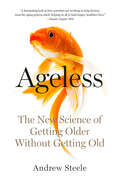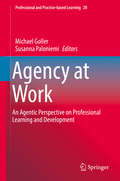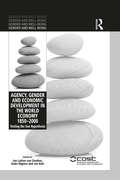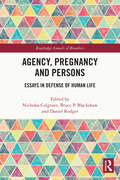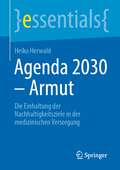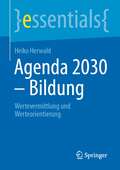- Table View
- List View
Ageing Asia and the Pacific in Changing Times: Implications for Sustainable Development
by John Burgess Subas Dhakal Alan NankervisThis book demonstrates that there are wide-ranging potential challenges in addressing issues associated with ageing populations in both developed and developing countries of the region. This book brings together local, national and regional perspectives on the ageing population and sustainable development nexus in selected countries in the Asia Pacific region. The countries selected in this book include a mix of developed and developing economies that all reflect strong trade, investment and migration linkages. While the Asia Pacific region is forecast to enjoy high growth in the coming decade, a recurring common policy challenge is addressing the ‘demographic time bomb’ posed by ageing populations and workforces (Montague et al., 2017). Consequently, this book focuses on strategic policies and practices of multiple stakeholders, primarily: governments, industry and education systems, together with, the range of aged care services providers – in more effectively addressing these key socio-economic challenges associated with the ageing population for sustainable development.
Ageing Issues and Responses in India
by Mala Kapur ShankardassThis book discusses emerging issues concerning ageing in India, describes the multi-layered vulnerabilities of older adults in the context of health care and caregiving, and explores social, legal and economic perspectives. It also analyses the existing policies and programmes intended to address these age-related issues and assesses the importance of preventive geriatrics towards active ageing, as well as the current scenario of institutional care for the elderly in India. Gathering fifteen chapters written by leading researchers in the fields of geriatrics, social work, anthropology, sociology, psychiatry, economics, law and mental health, the book presents the latest findings on ageing-related topics such as elderly health, family change, old age homes, age friendly environments and the role of integrative medicine. Accordingly, it offers a valuable resource for researchers, academics, practitioners and policymakers in the areas of gerontology, demography and sociology, as well as all those interested in the study of ageing populations.
Ageing Issues in India: Practices, Perspectives and Policies (International Perspectives on Aging #32)
by Mala Kapur ShankardassThis book explores various practices and policies related to ageing issues in India. It addresses ageing concerns from a theoretical and empirical viewpoint with in-depth analyses of existential dimensions of ageing. It provides deep insights into ageing in India by discussing demographics related to health and social differentials, gender concerns, retirement problems, epidemiological transition taking place in the country with rising problem of dementia and mental health problems. It consists of 23 chapters written by various established as well as upcoming scholars in the field. The authors cover a broad range of topics with regard to provisions for institutional care, geriatric practice and emerging issues of elder abuse. The book will appeal to professionals and to lay people getting interested in ageing India from a social, health, gender, economic, psychological and emotional aspects.
Ageing Well: Nutrition, Health, and Social Interventions (Society for the Study of Human Biology)
by Alan D. Dangour Astrid E. Fletcher Emily M. D. GrundyMany current public health actions and policies aimed at older people revolve around the often prevailing view that failing health is a consequence of ageing. It is now clear that it is possible to postpone or even prevent much of the age-related decline in health that was once thought inevitable. Future policies must recognise this changing paradi
Ageing and Covid-19: Making Sense of a Disrupted World (Social Perspectives on Ageing and Later Life)
by Maria ŁuszczyńskaThis volume presents a range of research approaches to the exploration of ageing during a pandemic situation. One of the first collections of its kind, it offers an array of studies employing research methodologies that lend themselves to replication in similar contexts by those seeking to understand the effects of epidemics on older people. Thematically organised, it shows how to reconcile qualitative and quantitative approaches, thus rendering them complementary, bringing together studies from around the world to offer an international perspective on ageing as it relates to an unprecedented epidemiological phenomenon. As such, it will appeal to researchers in the field of gerontology, as well as sociologists of medicine and clinicians seeking to understand the disruptive effects of the recent coronavirus outbreak on later life.
Ageing in Advanced Industrial States: Riding the Age Waves - Volume 3 (International Studies in Population #8)
by Naohiro Ogawa Anne H. Gauthier Shripad TuljapurkarPopulation growth slowed across the world in the last decades of the 20th century, changing substantially our view of the future. The 21st century is likely to see the end to world population growth and become the century of population aging, marked by low fertility and ever-increasing life expectancy. These trends have prompted many to predict a gloomy future caused by an unprecedented economic burden of population aging. In response, industrialized nations will need to implement effective social and economic policies and programs. This is the final volume in a series of three. The papers included explore many examples and strengthen the basis for effective economic and social policies by investigating the economic, social, and demographic consequences of the transformations in the structures of population and family. These consequences include changes in economic behavior, both in labor and financial markets, and with regard to saving and consumption, and intergenerational transfers of money and care.
Ageing in Sub-Saharan Africa: Spaces and Practices of Care (Ageing in a Global Context)
by Jaco Hoffman and Katrien PypeThis collection of in-depth ethnographic analysis examines the impact of local and global transformations on the care, or lack of care, older people receive in Sub-Saharan Africa. This volume provides the pan-African evidence and analysis needed to move forward debates about how to address the long term care needs of this vulnerable population. Case studies from different regions of the continent (southern, central, east and west Africa) examine formal and informal care, including inter- and intra-generational care, retirement homes, care in the context of poverty, HIV/AIDS and migration.
Ageing in Times of the COVID-19 Pandemic
by Clemens Tesch-Römer Julia Simonson Jenna WünscheThis Open Access Book contains reports on the situation of people in the second half of life during the first year of the Covid-19 pandemic. The analyses are based on the German Ageing Survey (DEAS) and they provide insights on four main areas of life: income and work, subjective health and well-being, social support and loneliness as well as societal participation.This book is useful for scientists as well as political actors by directing attention to the risk groups that have been hard hit by the pandemic while also highlighting the resilience and adaptive capacities of many people in the second half of life.
Ageing in a Nursing Home: Foundations for Care
by Rosalie HudsonSpending the final chapter of your life in a nursing home is considered, by many, a fate worse than death. Others, however, have found that through enlightened, imaginative care even the frailest of lives can flourish. The key to such a transformation is to replace the constricting custodial centres of the past with a more informed, research-based approach. This book is timely, responding to evidence of the urgent need for change described in the Australian Royal Commission into Aged Care Quality and Safety Final Report: Care, Dignity and Respect and its predecessor subtitled Neglect. In this book, the author proposes a model of care that places the whole person at its centre, sidestepping the constraints of a reductionist funding model that focusses on residents' deficits – and the proprietor’s financial gain. Aged care requires a comprehensive research-based guide to fulfil this aim. Narratives are included throughout the book to reinforce the fact that nursing home care is about individual residents and their unique lives. Topics explored in various chapters include:· Ageing in a Changing Community· Social, Gerontological Care· A Palliative Approach· Community Expectations Ageing in a Nursing Home: Foundations for Care takes a realistic approach that draws on contemporary research and narratives from the unique lives of older Australians who, despite their frailty, teach us how to care. Such knowledge informs and influences their future. The book is a resource intended for all who have a stake in the provision of best practice residential aged care, and all who benefit from such care. Its academic appeal will include those who design and teach courses in aged care: gerontology, general practice medicine, nursing, attendant care, allied health, and chaplaincy. Academics and teachers will find useful, well-referenced material for their courses, together with ample scope for researchers.
Ageing with Dignity in Hong Kong and Asia: Holistic and Humanistic Care (Quality of Life in Asia #16)
by Ben Yuk Fai Fong Vincent Tin Sing LawThis book advocates the application of holistic and humanistic approaches in elderly care and services to achieve the goal of ageing with dignity in Hong Kong and Asia. It responds to the needs of an increasing ageing population that has to deal with related health needs in long-term care, community health and social services, particularly for chronic conditions and psychosocial support. The book consists of three sections on policy and development of aged care, holistic and humanistic care for older adults, and capacity building for ageing with dignity, respectively. Topics include the latest initiatives in aged care, appropriate services and delivery models, lifestyle modification, psychosocial and environmental considerations, professional development, technologies, and social capital. The chapters review and discuss these issues within a global context, illustrated by examples from Asian countries, underpinned by locally based empirical research. Contributors include academics and practitioners from diversified professional backgrounds that include medicine, nursing, pharmacy, traditional Chinese medicine, dietetics, and allied health. The book traverses into territories in the social sciences, life sciences, and sports sciences, while also touching on areas of business and administration, hospitality, law, public policy, and information technology in connection with public health. The contents serve as a topical reference for tertiary studies in ageing and related disciplines such as well-being and are also useful to policymakers, community and public health practitioners, health executives and interns working in areas of policy and practice pertinent to care development, health delivery models, planning, quality, ethics, better health promotion, professional training, and monitoring for older adults.
Ageing, Disability and Spirituality: Addressing the Challenge of Disability in Later Life
by Elizabeth Mackinlay Christine Bryden Dagmar Ceramidas Eileen Mary Glass Matthew AnsteyThis collection examines theological and ethical issues of ageing, disability and spirituality, with an emphasis on how ageing affects people who have mental health and developmental disabilities. The book presents ways of moving towards more effective relationships between carers and older people with disabilities; ways in which to connect compassionately and beneficially with the person's spiritual dimension. The contributors highlight the importance of recognizing the personhood of all people regardless of age and of disability, whatever form it takes. They identify factors inherent in personhood and provide ways of affirming and promoting spiritual well-being for older people with disabilities. Valuable reading for practitioners in aged care, healthcare, chaplaincy, social and pastoral care, and diversional therapists, this book will also be of interest to older people, their families and friends.
Ageing, Health and Pensions in Europe
by Lans BovenbergProviding an overview of the future research challenges for economists and social scientists concerning population ageing, pensions, health and social care in Europe, this book examines how scientific research can provide cutting-edge evidence on income security and well-being of the elderly, and labour markets and older workers.
Ageing, Physical Activity and Health: International Perspectives (ICSSPE Perspectives)
by Karin Volkwein-Caplan Jasmin Tahmaseb McConathaOne of the most pressing questions facing society today is how to care for its burgeoning elderly population. By the year 2050, experts predict that one-third of the world’s population will be over 60 years old. Health promotion for the elderly is therefore becoming an increasingly important topic in public policy and planning. This book examines the challenges presented by an ageing global population, our varying expectations of healthy ageing, and the importance of exercise and physical activity for the elderly. Drawing on empirical research from around the world, it considers the factors that influence health and well-being in later life and compares practices and policies designed to promote healthy ageing. It presents case studies from 15 countries spanning Europe, North and South America, Africa and Asia, and sheds light on how attitudes to physical activity differ across nations, regions and cultures. Ageing, Physical Activity and Health: International Perspectives is important reading for all students, researchers and practitioners with an interest in physical activity, public health, exercise science or gerontology.
Ageing, the Body and the Gender Regime: Health, Illness and Disease Across the Life Course
by Susan Pickard Jude RobinsonThe current (postfeminist) gender order comprises a highly complex coexistence of old and new norms and expectations, freedom and constraints, within a neoliberal social order underpinned by individualism and involving a shift in gender performance by men and women. Health, illness and disease at different points in the life course can be used as a vehicle to illuminate structural and cultural inequalities that persist despite several decades of progressive reform in western countries. This collection brings together a number of key researchers, both established and new to the field, and based across North America, Australia, the UK and Europe, and comprises both empirical and theoretical work. Drawing on a wide range of disciplinary fields, including medical sociology, medical anthropology, nursing, gender studies, sociology of risk and age studies, all authors use heath, well-being, illness and disease as a lens through which to explore the complexities and inequalities associated with late modernity. This book will be of interest to scholars and students of age studies, medical sociology and anthropology, gender studies, healthcare and nursing.
Ageing-Friendly Neighbourhoods in Singapore, Asia-Pacific, Europe and North America: An Annotated Bibliography (SpringerBriefs in Aging)
by Belinda Yuen Špela Močnik Winston Yap Freya C.H. YuThis book brings together the emerging body of work on age-friendly neighbourhoods in Singapore, the Asia-Pacific region, Europe and North America. It begins with an overview chapter on the current state of policy, practice and research on age-friendly neighbourhoods in Singapore. This is followed by an annotated bibliography of published materials on age-friendly neighbourhoods in the above-mentioned countries and regions, encompassing theoretical work and empirical research reported on in journal articles, books and conference proceedings. The annotations for Singapore also map the grey literature, including unpublished dissertations and theses. The aim is to provide a sense of the scope of, issues in, and discourse on age-friendly neighbourhoods, the development of which is increasingly being recognised as a key strategy to support healthy ageing and enhance quality of life in ageing societies.
Ageism and Mistreatment of Older Workers: Current Reality, Future Solutions
by James J. Kelly Patricia BrownellThis book promotes an understanding of ageism, discrimination and mistreatment of older adult workers, incorporating an international human rights perspective. The impact of ageism on the mistreatment of older adult workers has not to date been examined in depth through the lens of international human rights instruments, nor has discrimination against older adults in the workplace been framed as a form of elder abuse for research and policy making purposes. This book presents a multi-disciplinary exploration of these themes as they affect work and retirement of older adults. It reflects the view that older people who choose to work into old age should be able to do so in enabling work environments that promote dignity and are free of abuse. The contributing authors come from many disciplines, including law, psychology, social work, business, and international affairs. Many are members of the International Network for the Prevention of Elder Abuse (INPEA), a non-governmental organization with consultative status at the United Nations, and have devoted their professional careers to increase awareness and understanding of elder abuse in order to prevent it. The editors hope that broadening the framework within which elder abuse in the workplace is understood will stimulate further research, policy and program development to address this troubling social problem.
Ageism and Person-Centred Care: Rehabilitating Bias for Age-Friendly Practice (Routledge Advances in the Medical Humanities)
by Stephen BuetowThis thought-provoking book exposes the values, judgements, and hierarchies that underlie ageism in care settings. Destabilizing the assumption that biases like ageism are always bad, Buetow suggests that ageism is normatively neutral and that truly person-centred care requires situated acknowledgement of and responsiveness to its negative and positive aspects.Buetow contends that respecting meaningful age differences between persons as moral agents puts ageism on the radar of care environments, weakening barriers to engagement. His analysis moves from concern for age-friendliness to prudent ageism that enables person-centred care to apply practical wisdom in everyday, age-sensitive judgement and decision-making. Challenging political correctness and advocating for justice rather than social justice, Buetow discusses how prudent ageism may advantage some age groups over others in particular circumstances while providing a moral structure for managing real rather than socially constructed differences.Looking at how age-sensitive judgments combined with a person first approach can inform research, policy, and practice, this book will interest students and researchers from fields like health and social care, and disciplines, such as sociology, psychology, politics, and philosophy.
Ageless Nation: The Quest for Superlongevity and Physical Perfection
by Michael G. ZeyIn this intriguing volume, futurist and author Michael G. Zey imagines a time in which technology has stretched human life spans to four hundred years or more. Genetic engineering, cloning, and stem-cell technology will eradicate diseases and allow for nanoscopic repair and maintenance of the body. "Smart drugs" and caloric restriction programs will largely stop aging and ensure healthy bodies and sharp minds indefinitely.Grounding his speculation in contemporary scientific research, Zey's optimistic vision sees retirement replaced by hiatuses between careers, and leisure time spent in multi-generational homes. Key players in the debate include supporters like Cambridge University scientist Aubrey de Grey, who envisions five-thousand-year life spans, and the radical futurist author Ray Kurzweil, who foresees the merging of humans and computers. Organizations such as the Coalition to Extend Life lobby the government for immortality research funding and find opposition in the President's Council on Bioethics and "deep ecologists" advocating zero-population growth.Criticizing current environmental trends as anti-progress and anti-human, Zey's own solutions include controversial measures like human control of weather, colonization of outer space, and genetically modifying food. He concludes that the eventuality of a modern Fountain of Youth is closer than we think. Zey's predictions about the future are thoughtful and fascinating.
Ageless: The New Science of Getting Older Without Getting Old
by Andrew SteeleA startling chronicle by a brilliant young scientist takes us onto the frontiers of the science of aging, and reveals how close we are to an astonishing extension of our life spans and a vastly improved quality of life in our later years.Aging--not cancer, not heart disease--is the true underlying cause of most human death and suffering. We accept as inevitable that as we advance in years our bodies and minds begin to deteriorate and that we are ever more likely to be felled by dementia or disease. But we never really ask--is aging necessary? Biologists, on the other hand, have been investigating that question for years. After all, there are tortoises and salamanders whose risk of dying is the same no matter how old they are. With the help of science, could humans find a way to become old without getting frail, a phenomenon known as "biological immortality"?In Ageless, Andrew Steele, a computational biologist and science writer, takes us on a journey through the laboratories where scientists are studying every bodily system that declines with age--DNA, mitochondria, stem cells, our immune systems--and developing therapies to reverse the trend. With bell-clear writing and intellectual passion, Steele shines a spotlight on a little-known revolution already underway.
Agency at Work: An Agentic Perspective on Professional Learning and Development (Professional and Practice-based Learning #20)
by Michael Goller Susanna PaloniemiMichael Goller gives a structured overview of the current discourses of human agency in relation to professional learning and development. Based on this discussion, the author develops a theoretical framework including human agency as an individual feature (i. e. , a disposition) as well as a set of self-initiated and goal-directed behaviours that are assumed to affect employees' learning and development (e. g. , crafting of new work experiences). He then further specifies this theoretical framework and investigates it empirically in the domain of geriatric care nursing. Based on the findings of the three empirical studies conducted, the author discusses the relevance of human agency for the development of professional expertise of geriatric care nurses.
Agency, Gender and Economic Development in the World Economy 1850–2000: Testing the Sen Hypothesis (Gender and Well-Being)
by Jan Luiten van Zanden Auke Rijpma Jan KokHow has ‘agency’ – or the ability to define and act upon one’s goals – contributed to global long-term economic development during the last 150 years? This book asserts that autonomous decision making, and female agency in particular, increases the potential of a society to generate economic growth and improve its institutions. Inspired by Amartya Sen’s capabilities approach and looking at this in comparison to contemporary economic theory, the collection of chapters tackles the issue of agency from the micro level of household and family formation and asks how this applies to gender at regional and state level. It brings to the fore new empirical data from across the globe to test the links between family systems, female agency, human capital formation, political institutions and economic development and puts these into broader historical context. It will appeal to scholars researching social policy, gender studies, economic history, development studies and philosophy, as well anyone with interests in the long-term societal development of the world economy and issues of global inequality.
Agency, Pregnancy and Persons: Essays in Defense of Human Life (Routledge Annals of Bioethics)
by Nicholas Colgrove Bruce P. Blackshaw Daniel RodgerThis book provides extensive and critical engagement with some of the most recent and compelling arguments favoring abortion choice. It features original essays from leading and emerging philosophers, bioethicists and medical professionals that present philosophically sophisticated and novel arguments against abortion choice. The chapters in this book are divided into three thematic sections. The first set of essays focuses primarily on unborn human individuals—zygotes, embryos and fetuses. In these chapters it is argued, for example, that human organisms begin to exist at conception and that zygotes, embryos and fetuses are persons. These chapters also explore questions about whether or not zygotes, embryos and fetuses are part of their mothers’ bodies. The second set of essays focuses primarily on elective abortion and the debates surrounding it. These chapters consider whether or not opponents of abortion are commonly hypocritical, how opponents of abortion should think about adoption, how emerging technologies may affect the current debate and whether or not those participating in the debate should rely on analogies to support their case. Finally, the third set of essays shifts focus from the legal and moral status of elective abortion to its place in medical practice. In these chapters it is argued that elective abortion embodies a kind of ableism, and that elective abortion is medically unnecessary, harmful to women’s mental health and that telemedicine abortion poses significant risks to women’s health. Agency, Pregnancy and Persons offers an up-to-date examination of unborn human beings, the debates surrounding elective abortion and the place of elective abortion within medical practice. It will be of interest to medical professionals and those who work in philosophy, bioethics and medical ethics alike.
Agenda 2030 – Armut: Die Einhaltung der Nachhaltigkeitsziele in der medizinischen Versorgung (essentials)
by Heiko HerwaldIn diesem essential werden die aktuellen Probleme der Agenda 2030 zur Umsetzung der Nachhaltigkeitsziele im Bereich Gesundheit erläutert. Das weltweite Aufkommen von Zivilisationskrankheiten und die explodierenden Kosten in der medizinischen Versorgung stellen die Weltgemeinschaft in Zeiten von Corona und Krieg vor große Herausforderungen. Um einen weiteren Rückschritt in der globalen Gesundheitsversorgung zu vermeiden, müssen gemeinsame und nachhaltige Lösungen gefunden werden. Hierzu müssen Stakeholder aus allen Sektoren, öffentlichen wie privaten sowie nationalen als auch internationalen, in die Verantwortung genommen werden.
Agenda 2030 – Bildung: Wertevermittlung und Werteorientierung (essentials)
by Heiko HerwaldDie Agenda 2030 hat sich zum Ziel gesetzt, eine Welt ohne Armut, Hunger und Krankheit zu schaffen und dafür zu sorgen, dass jeder Mensch ein Leben frei von Furcht und ohne Unterdrückung führen kann. Um dies zu erreichen, muss jeder Mensch auch ein Recht auf Bildung haben. Ganzheitliche Bildungskonzepte sind hierbei von großer Bedeutung, da mit ihnen ein Umdenken zu einer nachhaltigen Lebensweise in allen Gesellschaftsbereichen erzielt werden kann. Denn ohne eine breite Unterstützung in der Bevölkerung können die Ziele der Agenda 2030 nicht umgesetzt werden. Eine weitere Aufgabe von Bildung ist es, soziale Klassenunterschiede abzubauen. Nach wie vor ist es in vielen Ländern aufgrund von fehlenden Ausbildungsmöglichkeiten nicht möglich, gesellschaftliche Klassenunterschiede zu überwinden. Im vierten der siebzehn Agenda 2030 Nachhaltigkeitsziele spielt das Thema Bildung eine zentrale Rolle. Es wird unter anderen gefordert, flächendeckend Bildungseinrichtungen zu schaffen, damit bis 2030 allen Menschen Zugang zu einer gleichberechtigten und hochwertigen Bildung gewährleistet werden kann.
Aggregation of Therapeutic Proteins
by Wei Wang Christopher J. RobertsThis book gives pharmaceutical scientists an up-to-date resource on protein aggregation and its consequences, and available methods to control or slow down the aggregation process. While significant progress has been made in the past decade, the current understanding of protein aggregation and its consequences is still immature. Prevention or even moderate inhibition of protein aggregation has been mostly experimental. The knowledge in this book can greatly help pharmaceutical scientists in the development of therapeutic proteins, and also instigate further scientific investigations in this area. This book fills such a need by providing an overview on the causes, consequences, characterization, and control of the aggregation of therapeutic proteins.
